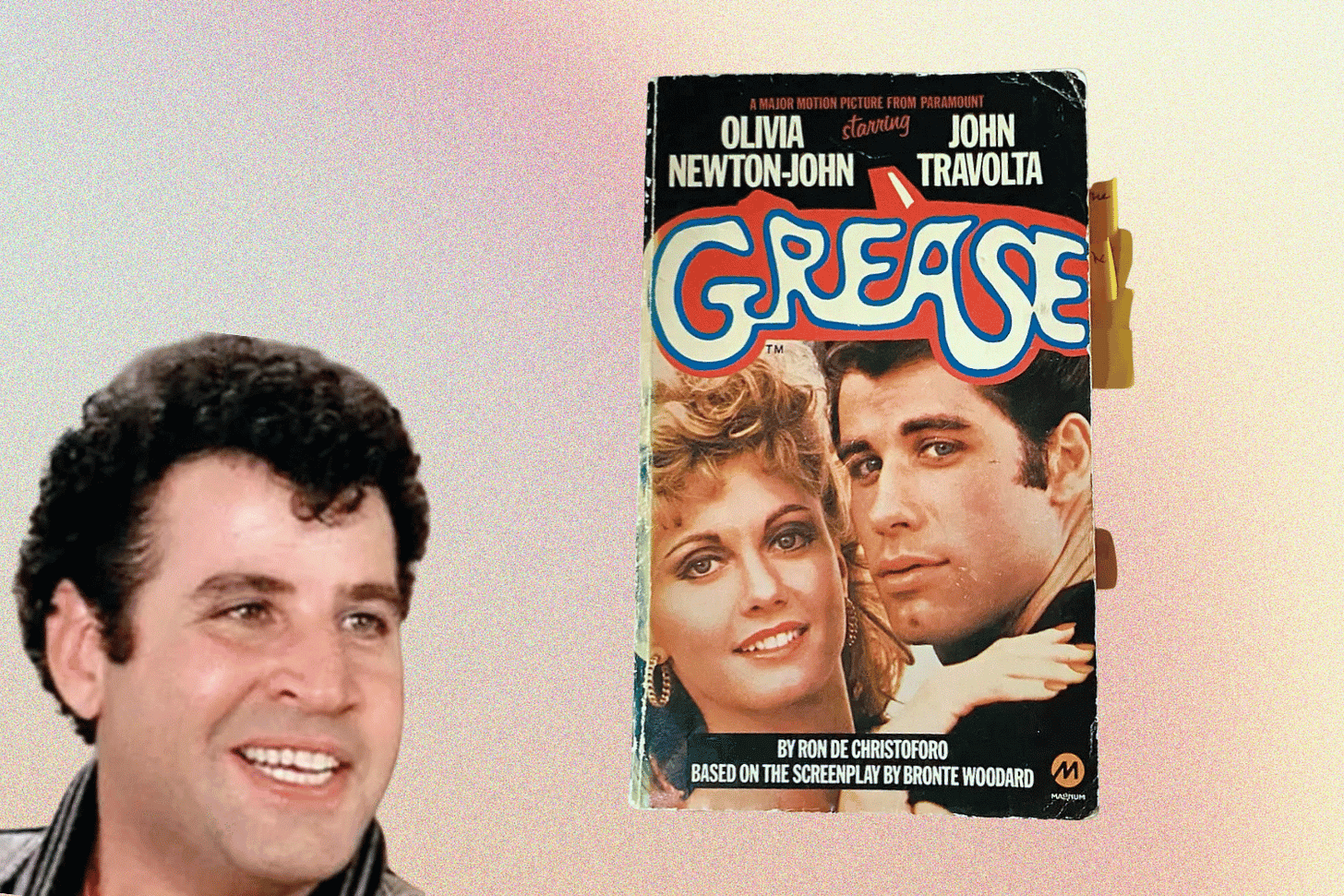Sonny LaTierri, You Will Always Be Famous
This grimly funny novelization of movie musical "Grease" is narrated by Sonny, that one T-Bird you forgot about
In a place of prominence on my bookshelf, I have a few favourite novelties: The Berenstain Bears and the Drug-Free Zone, an unauthorized Madonna biography from 1989, Candy Spelling's deeply confusing but fabulously titled memoir. But the crown jewel is Ron de Christoforo's novelization of the 1978 film Grease.
Published in 1978, the same year as the movie, by Magnum Books, Grease is adapted from Bronte Woodard’s screenplay. With its movie-poster cover (my copy even includes John Travolta and Olivia Newton-John's star billing), one would think this is a straight screen-to-page adaptation. Oh, it's so much more than that.
De Christoforo's novelization is a bold departure from the movie: sure, Danny and Sandy are in it, but they don't narrate.
Sonny LaTierri is our narrator.
You know, this guy:
De Christoforo commits hard to this choice, giving us an opening line rivalling The Catcher in the Rye for its blasé conversational tone:
"Now, to tell you the truth, the thing you got to realize before you set out to read a story about the fifties is that nothing ever happened."
Sonny rambles for a while about his favourite fifties musicians before letting us meet some familiar faces like Kenickie (who, in the novel, has Donald Duck and his own name tattooed) and Rizzo (who's introduced in a sequence where she gives each T-Bird a "deep, red, juicy, hickie") as they pile into the Frosty Palace. Please note that the movie's plot has not started at this point—we're world-building.
Sonny's voice is clear and pretty vulgar, with a distinctive vibrance and a semi-uncomfortable and often hilarious self-confidence.
"Then there was me, Sonny LaTierri. Like I said, some of the chicks thought I was a real hunk, with my black hat and black shades, black shirt and pants. The Midnight Rider was what they called me. Good-looking, dark, and sexy, but not too tall. Yeah, they loved it. Dressing in black was kind of my trademark, and besides, my mother said it was easier on her washing my clothes."
I love it.
When I said De Christoforo commits to Sonny as the narrator, I meant it: Sonny's inserted into Danny and Sandy's beach scenes and at the drive-in; he's the primary motivator to get Danny to race at Thunder Road. Moreover, Sonny has a summer love of his own! Her name is Marsha, which gets a touch confusing because she's distinct from Marty, and serves as Sonny's reporter on all things Pink Ladies.
Much of the dialogue is lifted nearly verbatim from the film, including Principal McGee's iconic admonishment of Sonny's hallway dawdling.
The musical numbers, too, become dialogue to varying degrees of believability. The T-Birds watch as Kenickie snaps his fingers and recites the "Greased Lightnin'" lyrics like a beat poem (hey, it was the fifties.)
The interpretation of "Beauty School Dropout" gives us Frenchie recounting Frankie Avalon's lecture:
"Teen Angel really rubbed it in. I mean he said, 'Beauty School dropout, Beauty School dropout' over and over again. He knew I flunked my midterms and that I even failed shampoo!"
It's ridiculous, and, again, I love it.
Sometimes, giving us an insight into Sonny's psyche actually deepens the story. One chapter has the T-Birds react to the news of the plane crash that killed Buddy Holly, Richie Valens, and the Big Bopper. The movie is all sparkly nostalgia, but the book attempts something a little more genuine.
The real story here is Sonny coming of age while still stuck in his bubble of hamburgers and outlandish car races.
Increasingly complicated contrivances pop up to keep us floating through the movie's familiar storyline: at one point, he sheepishly admits to eavesdropping through a bathroom wall, solely so we can follow along with where the girls' minds are regarding Danny and Sandy:
"Like I said, I felt a little weirded out by this predicament, but you got to understand this was no Peeping-Tom or ear-to-the-glass-against-the-wall intrusion—this was first-class espionage. High ranked intelligence work. Vital info coming in waves. I settled down with a smoke, and tried to picture what was happening on the other side of that wall as I recognized the Pink Ladies' voices…"
I suspect that, by this point, it was getting harder to think of reasons for Sonny to be present. He did say that nothing ever happens to him, so I almost believe he'd be this invested in the social lives of his tertiary circle. Almost.
Maybe De Christoforo's efforts would have been better suited to a story that didn't require a constant reminder of John Travolta's presence.
This weird little novel is, I'd argue, generally grimmer and funnier than the movie. He has big feelings but little language for them. There's a real sadness in aimless Sonny, but he doesn't quite seem to know how to phrase it:
"We were very drunk, very loud, very sloppy, and very depressed."
We end with a solemn goodbye and a sigh of relief as the nifty fifties end. This ending comes out of nowhere, but it makes more sense than the movie's flying car. If this novelization is to be believed, Sonny is singlehandedly responsible for Danny and Sandy's romance.
He's a balladeer, a hero in his mind, which makes him a hero in mine, too!
Genuinely richly voiced and bizarrely unique enough to (sort of) stand on its own Grease is best read as a glory days tall tale.







Now I feel I have to read this book! I love GREASE
Thank you ♥️